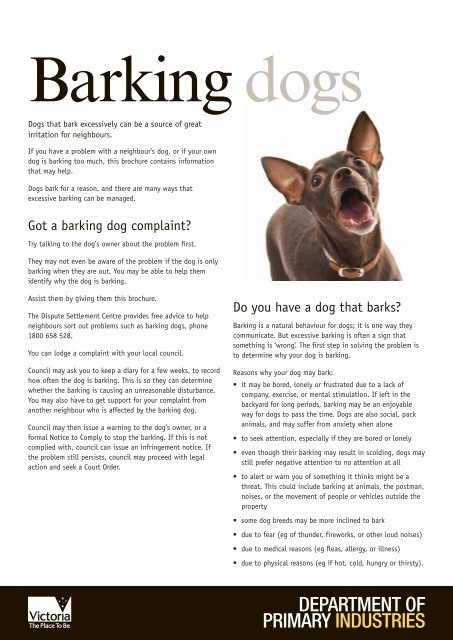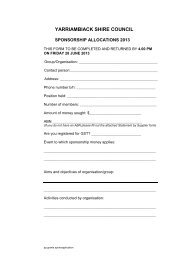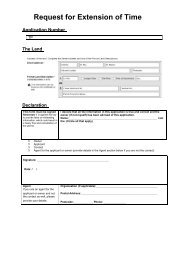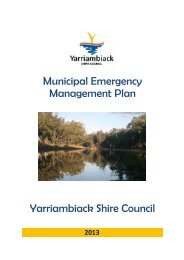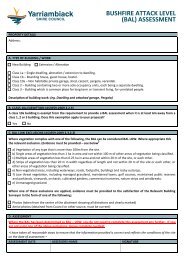Barking Dogs - Yarriambiack Council
Barking Dogs - Yarriambiack Council
Barking Dogs - Yarriambiack Council
You also want an ePaper? Increase the reach of your titles
YUMPU automatically turns print PDFs into web optimized ePapers that Google loves.
<strong>Barking</strong> dogs<strong>Dogs</strong> that bark excessively can be a source of greatirritation for neighbours.If you have a problem with a neighbour’s dog, or if your owndog is barking too much, this brochure contains informationthat may help.<strong>Dogs</strong> bark for a reason, and there are many ways thatexcessive barking can be managed.Got a barking dog complaint?Try talking to the dog’s owner about the problem first.They may not even be aware of the problem if the dog is onlybarking when they are out. You may be able to help themidentify why the dog is barking.Assist them by giving them this brochure.The Dispute Settlement Centre provides free advice to helpneighbours sort out problems such as barking dogs, phone1800 658 528.You can lodge a complaint with your local council.<strong>Council</strong> may ask you to keep a diary for a few weeks, to recordhow often the dog is barking. This is so they can determinewhether the barking is causing an unreasonable disturbance.You may also have to get support for your complaint fromanother neighbour who is affected by the barking dog.<strong>Council</strong> may then issue a warning to the dog’s owner, or aformal Notice to Comply to stop the barking. If this is notcomplied with, council can issue an infringement notice. Ifthe problem still persists, council may proceed with legalaction and seek a Court Order.Do you have a dog that barks?<strong>Barking</strong> is a natural behaviour for dogs; it is one way theycommunicate. But excessive barking is often a sign thatsomething is ‘wrong’. The first step in solving the problem isto determine why your dog is barking.Reasons why your dog may bark:• it may be bored, lonely or frustrated due to a lack ofcompany, exercise, or mental stimulation. If left in thebackyard for long periods, barking may be an enjoyableway for dogs to pass the time. <strong>Dogs</strong> are also social, packanimals, and may suffer from anxiety when alone• to seek attention, especially if they are bored or lonely• even though their barking may result in scolding, dogs maystill prefer negative attention to no attention at all• to alert or warn you of something it thinks might be athreat. This could include barking at animals, the postman,noises, or the movement of people or vehicles outside theproperty• some dog breeds may be more inclined to bark• due to fear (eg of thunder, fireworks, or other loud noises)• due to medical reasons (eg fleas, allergy, or illness)• due to physical reasons (eg if hot, cold, hungry or thirsty).
How to solve the problemDepending on why your dog is barking, you may need to:• Take the dog on more frequent walks (once or twice daily)and include it on family outings. Even if you have a largeyard, dogs still need to socialise and experience the soundsand smells of walks outside.Find a designated off leash area to give your dog a free run.• Make the backyard environment more interesting.• Provide the dog with toys and a large raw marrow bone tochew. You can also stuff hollow (indestructible) toys withfood. Ensure the dog has fresh water, a balanced diet, andadequate shelter from weather extremes. If possible, givethe dog access to the house through a dog door.• Take your dog to obedience classes. Practice what youlearn regularly to provide mental stimulation for the dog.• If the dog is barking at passers-by, block its view ofmovement outside the property with solid fencing,shade cloth or hedging. Alternatively, if the source ofprovocation is a human (eg children teasing the dog), tryto discuss the problem with them.• Make sure your dog is in good health, by taking it to thevet for a check up.• Undertake dog training – the approach taken will dependon the reason for barking.Training your dogIf you need help with dog training, ask your local council,vet or shelter for advice. They may be able to suggestan obedience club, a dog trainer or an animal behaviourspecialist. Or look under ‘Dog Training’ in the yellow pages.It is important to remember that training takes time andpersistence, and that you should never hit your dog.Training can teach your dog what is and isn’t acceptable tobark at, and there are various techniques available.You may have to use particular training techniques totreat some problems. For instance, separation anxiety, ordesensitising your dog to fears or phobias. Seek professionaladvice from a dog trainer or behaviourist.For more advice or informationCall your local council if you have questions about yourrights and responsibilities as a dog owner, or if you have lostyour dog. Your council will also deal with concerns aboutwandering or nuisance dogs.Advice is also available from animal welfare shelters, vetsand dog clubs. Visit www.dpi.vic.gov.au/pets for contactdetails for such organisations, or call 136 186 for the costof a local call.If you would like to receive this information/publication inan accessible format (such as large print or audio) please callthe Customer Service Centre on 136 186, TTY 1800 122 969,or email customer.service@dpi.vic.gov.au.Published by the Department of Primary Industries, April 2010.© The State of Victoria 2010.This publication is copyright. No part may be reproduced by any processexcept in accordance with the provisions of the Copyright Act 1968.Authorised by the Department of Primary Industries, 1 Spring Street, Melbourne 3000.ISBN 978-1-74217-294-1 (print)ISBN 978-1-74217-295-8 (online)DisclaimerThis publication may be of assistance to you but the State of Victoria and itsemployees do not guarantee that the publication is without flaw of any kindor is wholly appropriate for your particular purposes and therefore disclaimsall liability for any error, loss or other consequence which may arise from yourelying on any information in this publication.For more information about DPI go to www.dpi.vic.gov.auor phone the Customer Service Centre on 136 186.GG/BD/0410www.dpi.vic.gov.au


